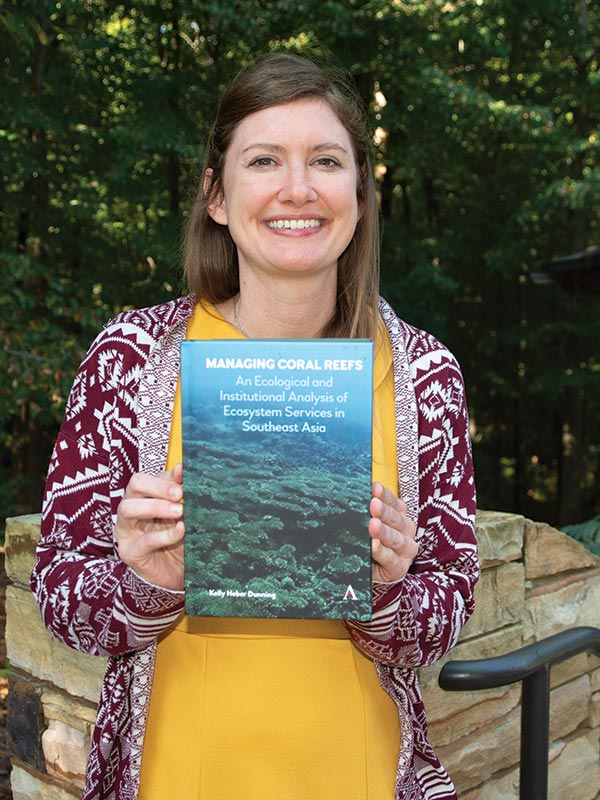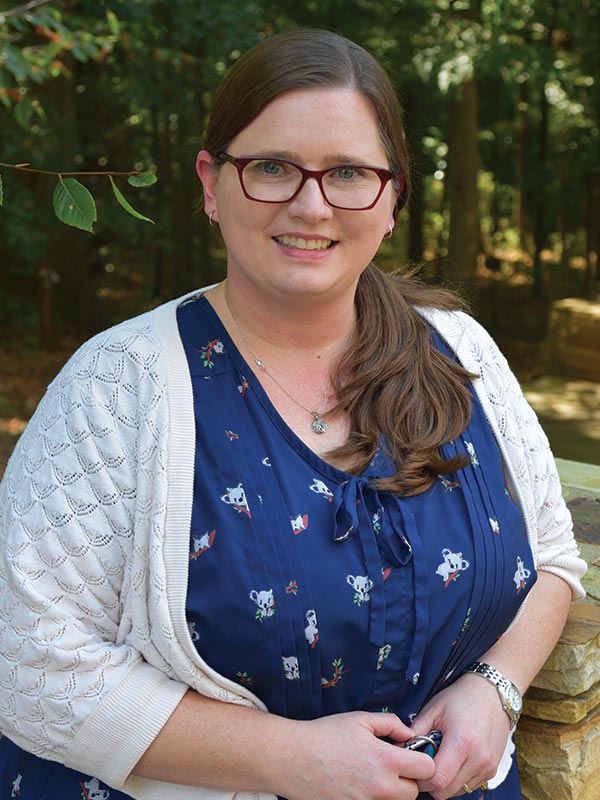New faculty members share the latest in forestry, conservation and wildlife research
Article body
Professions are constantly evolving, technologies are rapidly changing, and our environment is continually shifting. To meet the demands of students seeking to have careers in the fields of forestry and wildlife conservation and management, Auburn University’s School of Forestry and Wildlife Sciences has hired three faculty members, each bringing a unique set of skills and expertise to mentor and train students.
Dunning’s Research on Protected Resource Areas Suggests Local Authority is Best
After years of study and field work focused on the management of protected natural resource areas, Dr. Kelly Dunning says that giving natural resource management and decision-making authority to the local community may be the best practice.
Dunning, who joined the faculty last fall as an assistant professor, comes to Auburn with more than 10 years of field and academic experience. Dunning, who holds advanced degrees from the Massachusetts Institute of Technology (MIT) and Oxford University, is regarded as an expert in natural resource management and policy.
“I am interested in how fishermen, hunters and other sportsmen enact environmental policy change,” Dunning said. “I also am interested in how sportsmen engage in collective behavior to conserve public lands; how communities adapt to ecological changes both human and man-made; and how ecosystem services, or the benefits to human well-being created by nature, are impacted by environmental change.”
Before coming to Auburn, Dunning directed the Coastal Training Program at the University of Texas at Austin’s Marine Science Institute and the Mission-Aransas National Estuarine Research Reserve. Her field work involves primarily aquatic MPAs (Marine Protected Areas), and she has spent time working in Africa’s Congo region rain forests, as well as studying the coral reef management programs in Malaysia and Indonesia.
“In Malaysia, the highest levels of the government regulate national park resources—just as in the U.S.—but in Indonesia, power has been given to the local community to make major management decisions,” Dunning said.
Dunning teaches conservation planning in the School of Forestry and Wildlife Sciences.
Spaceborne Remote Sensing Improves Forest Management Data-Gathering Capabilities
Using satellite technology to study the forest may sound a bit like science fiction, but Dr. Lana Narine is doing just that and says adding the capabilities of spaceborne technology in this effort greatly enhances forest management capabilities.
Narine joined the faculty as an assistant professor in the fall. She comes to Auburn from Texas A&M University, where she earned her Ph.D. degree in ecosystem science and management. Before returning to work on her doctorate, Narine worked for a time in the private sector as a geographic information systems (GIS) analyst in Houston.
Narine’s dissertation, “Spaceborne Lidar for Estimating Forest Biophysical Parameters,” involved the development of approaches for utilizing data from the Ice, Cloud and Land Elevation Satellite-2 (ICESat-2) for estimating forest attributes. “Light detection and ranging (lidar) systems provide data about the three-dimensional structure of forests, which can be analyzed to estimate forest parameters that are indicative of forest health and functioning,” Narine said. “Data from lidar sensors on aerial and spaceborne platforms offer an incredible opportunity to assess forest resources over large extents, including areas traditionally inaccessible or difficult to access via ground inventories.”
Narine became interested in geospatial technology as a graduate student at the University of Missouri, Columbia, where she earned bachelor’s and master's degrees in forestry and a graduate GIS certificate. She later went on to Texas A&M, where she conducted research focused on remote sensing of vegetation structure.
At Auburn, she is teaching GIS applications in natural resources and applications in environmental informatics.
Genomics Research is Helping Environmentalists Learn About Effects of Climate Change
Climate change is a topic at the forefront among environmentalist and conservation groups, and Dr. Janna Willoughby conducts research that is showing how changes in the genetic makeup of species can lead to a better understanding of wildlife population adaptability to environmental change.
Willoughby has extensively studied steelhead salmon, a fish native to the Pacific Northwest. Steelhead are born in fresh water, migrate to live in saltwater oceans and then return to their natal freshwater origin to spawn. This is a cycle that is repeated annually.
About 100 years ago, steelhead salmon were successfully introduced to the Great Lakes region of the United States.
“They are native to the Pacific coast, but they have been introduced across the U.S. into wholly freshwater systems,” Willoughby said. “They undergo that same annual spawning migration, with the Great Lakes serving as a sort of surrogate ocean. Although this is not the steelhead’s natural habitat, they have effectively adapted to that environment.”
A native of Columbus, Ohio, Willoughby earned her doctorate in genetics from Purdue University and a master’s in conservation biology from Central Michigan University. She teaches a course in conservation history and law, and plans to introduce a new course in conservation genetics.
Auburn University is a nationally ranked land grant institution recognized for its commitment to world-class scholarship, interdisciplinary research with an elite, top-tier Carnegie R1 classification and an undergraduate education experience second to none. Auburn is home to more than 30,000 students, and its faculty and research partners collaborate to develop and deliver meaningful scholarship, science and technology-based advancements that meet pressing regional, national and global needs. Auburn's commitment to active student engagement, professional success and public/private partnership drives a growing reputation for outreach and extension that delivers broad economic, health and societal impact. Auburn's mission to educate, discover and collaborate drives its expanding impact on the world.




